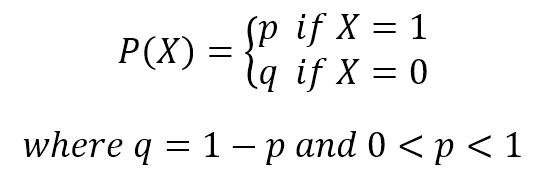Naive Bayes in scikit-learn
scikit-learn implements three naive Bayes variants based on the same number of different probabilistic distributions: Bernoulli, multinomial, and Gaussian. The first one is a binary distribution, useful when a feature can be present or absent. The second one is a discrete distribution and is used whenever a feature must be represented by a whole number (for example, in natural language processing, it can be the frequency of a term), while the third is a continuous distribution characterized by its mean and variance.
Bernoulli naive Bayes
If X is random variable and is Bernoulli-distributed, it can assume only two values (for simplicity, let's call them 0 and 1) and their probability is:

To try this algorithm with scikit-learn, we're going to generate a dummy dataset. Bernoulli naive Bayes expects binary feature vectors; however, the class BernoulliNB has a binarize parameter, which allows us to specify a threshold that will be used internally to transform the features...


































































